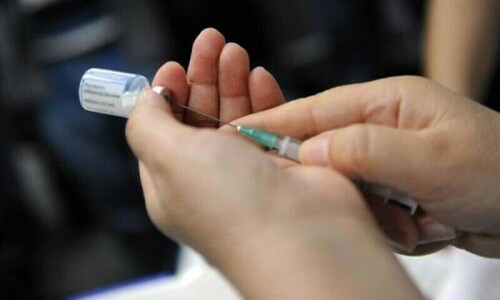KARACHI: As the public authority endeavors to handle numerous flare-ups of immunization preventable sicknesses in the territory, specialists have required a test into the viability of diphtheria antibody presently being utilized for counteraction against the exceptionally infectious bacterial contamination.
The specialists have likewise stressed the requirement for expanding the inoculation inclusion age-bar (presently one day to two years) to five years — a proposal extremely past due — provided the reality with that countless youngsters neglect to get their immunization portions at the age indicated under the Extended Programme for Vaccination (EPI).
According to sources, although measles cases have decreased significantly in recent weeks, diphtheria cases are rising, particularly in Karachi.
Subject matter authorities agree, albeit the two contaminations are antibody preventable, the casualty rate in diphtheria is a lot higher — around 30 to 40 percent in unvaccinated more youthful youngsters.
In 2023, the EPI data indicate that three outbreaks in Karachi’s Central, East, and Keamari districts resulted in the deaths of 55 children from diphtheria.
This year, outbreaks have been reported in Larkana and Dadu as well as the West, Keamari, and East districts of Karachi, resulting in the deaths of at least 40 children.
Out of the “219 suspected cases reported this year,” the department has only confirmed 30 diphtheria cases, which is surprising.
“This rush of flare-ups going on starting around 2023 shows absence of convenient activity. Second, a senior doctor at a private hospital stated, “Surveillance officers are reportedly discarding diphtheria cases where the toxin production [an additional test] is negative but the cultures [for isolating the bacterium] are positive.”
Situation severity According to sources, the Sindh Infectious Diseases Hospital and Research Centre (SIDH&RC) in Karachi is responsible for the deaths of 20 children this year, the majority of whom were between the ages of three and ten.
During the current year, the same hospital has received over 80 diphtheria patients with the infection.
Source expressed that at present 16 youngsters with diphtheria are under treatment at the emergency clinic, which is one of a handful of the public authority upheld wellbeing offices in the territory where the counteragent expected for treatment is accessible.
“For the present, we can’t take different patients,” shared a specialist at the clinic on the state of namelessness.
Six children died from diphtheria at the Aga Khan University Hospital (AKUH), according to sources—three in April and as many in September—out of 17 patients admitted for treatment between January and October of this year.
27 diphtheria patients were admitted to the hospital the previous year.
This year, diphtheria has claimed the lives of three children at the Dr. Ruth Pfau Civil Hospital in Karachi. A complete 27 patients with diphtheria were confessed to the emergency clinic this year.
This year, diphtheria has killed one person at the Indus Hospital.
“Measles cases have declined essentially while diphtheria cases are expanding. According to Dr. Samina Junejo, senior paediatric infectious diseases consultant at the Indus Hospital, “We have also seen children who got infected despite getting three doses of the diphtheria vaccine [under the EPI programme].” The majority of these cases involve children who have not been vaccinated or have only been partially vaccinated.
She underlined the requirement for exploring the adequacy of the diphtheria immunization.
Dr. Junejo stated, “The two booster doses that are required for better immunity levels according to the WHO guidelines are not part of the EPI program.”
A significant obstruction to giving treatment, she brought up, was the intense deficiency of the counteragent. ” There is as yet a deficiency and we are compelled to allude patients to medical clinics where the diphtheria counteragent is accessible.”
Diphtheria’s return Dr. Khalid Shafi of the Pakistan Paediatric Association stated that the disease had staged a comeback after 30 years and that there would be hardly any cases of the infection before 2023 in order to explain the severity of the public health crisis brought on by diphtheria outbreaks.



